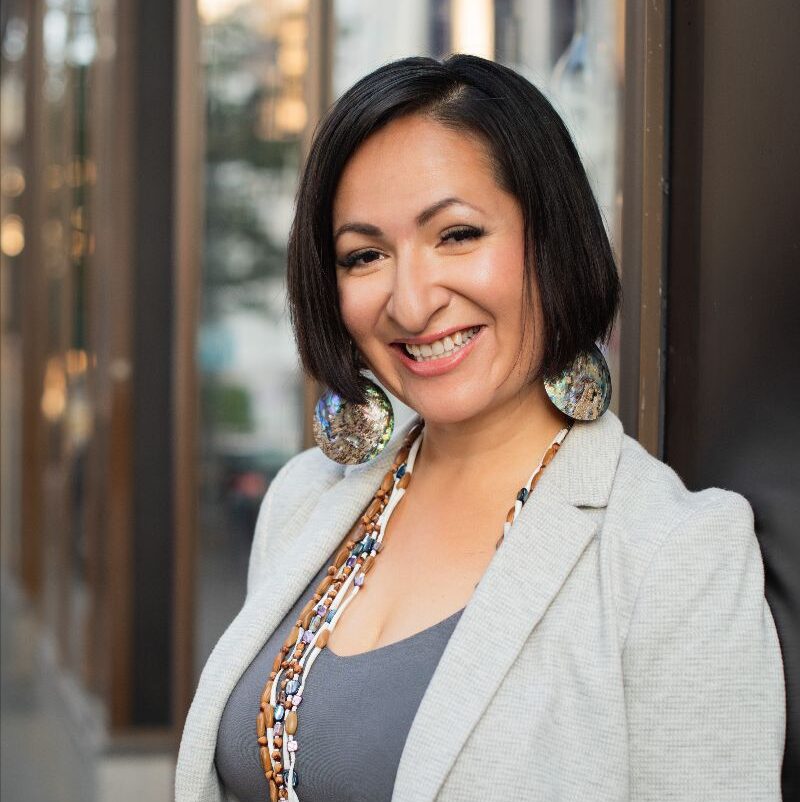Interview with New Executive Director Leah Altman
Meet our new executive director, Leah Altman!
Leah Altman recently joined Confluence as executive director. Mary Rose Navarro, interim executive director, interviewed Leah about her history, passions, and the path that led her to Confluence.
Mary Rose Navarro: So, Leah, tell me a bit about yourself.
Leah Altman: My birth father is Oglala Lakota from the Pine Ridge Reservation in South Dakota and my birth mother is from Tehran. I was one of four children, and when I was four months old I was adopted out to a family here in Portland. My adoptive mother is mostly German and Irish, and my adoptive father is Diné, Navajo.
There’s a lot of background into the psychology around adoption, especially for Native children. I struggled a lot. I dropped out of three different high schools. I was on kind of a bad road.
But I got into a high school recovery program called Gateway to College and I ended up doing really, really well. I also got involved in NAYA, the Native American Youth and Family Center, Janus Youth Programs, and PlayWrite. Those wraparound programs helped me pull through some of the harder challenges in my teenage years.
I got connected to the urban Native community here in Portland and Vancouver. I found some great mentors, got involved in ceremonies, and met other Lakota people. They taught me a healthier way of living that resonated with me as a young Native person trying to figure out my identity.
Those interventions turned my life around and have driven and inspired my passion for nonprofit work, particularly working with youth and families.
Mary Rose Navarro: When did you start developing your dream of being a leader?
Leah Altman: When I was younger, I definitely didn’t see myself as a leader. But I was told by Elders and others in programs I was involved with that I had leadership potential. I naturally shied away from that, mainly because, honestly, I’m kind of shy.
After school I worked for Nicole Maher, executive director at NAYA. I was writing grants, fundraising, doing social media and communications work, their annual report and such things. That launched my career. I started out in local nonprofits and then moved into national, most recently the Intertribal Agriculture Council.
Nicole really inspired me, along with other Native women who broke the mold. She challenged people to think of leadership differently and that encouraged me to reenvision what I thought leadership was.
I’ve gone through the Executive Leadership Academy through the People’s Nonprofit Accelerator. I’ve taken all their courses. They really grow leaders and help people like me get through the “imposter syndrome” so you feel like a leadership position is within reach.
Mary Rose Navarro: What is the importance of breaking barriers?
Leah Altman: One time, I brought my daughter, Acacia, to a PGE Foundation meeting when she was a baby. You could see that was different, but people were supportive and even took turns holding the baby. At the end of the day, we ended up increasing their support for the organization. Bringing the baby kind of broke a barrier.
And so there are ways in which I break barriers as a leader, and I’m not afraid to do it. It’s something I enjoy and I have seen is appreciated. I believe in taking the time to ensure we’re not just checking off boxes, that we’re actually really thinking about the best strategies and solutions. I’ve gotten a lot of positive feedback, and I’m excited to bring that to Confluence.
Mary Rose Navarro: Tell me about your daughters.
Leah Altman: Aurora is 8, and Acacia will be 6 in October. They are fierce and sassy like their mom. They both have a sense of humor and love being outside, love the beach, and love art. We do a lot of art projects together.
Mary Rose Navarro: What else do you like to do for fun?
Leah Altman: Powwow dancing and bead work. And billiards. My parents bought a pool table and my whole family played. I started playing when I was 12, and I’ve been in a pool league since I was 21. Now I play in a league in Vancouver called the Billiards Congress of America. I’m also a writer and my memoir, Cekpa, will be out in November 2025. It’s the story of finding my birth family when I was 21 and getting enrolled in my tribe.
Mary Rose Navarro: In what ways do you hope to grow as a leader here at Confluence?
Leah Altman: You can look at my resume and see my top three areas of passions—youth and families, arts, and environmental nonprofits. Those are the spaces in which I’ve seen Confluence inhabit. I will be aligning my life work with what I do on a daily basis, doing what I love. And then pushing out of my comfort zone to be able to do something really fulfilling.

